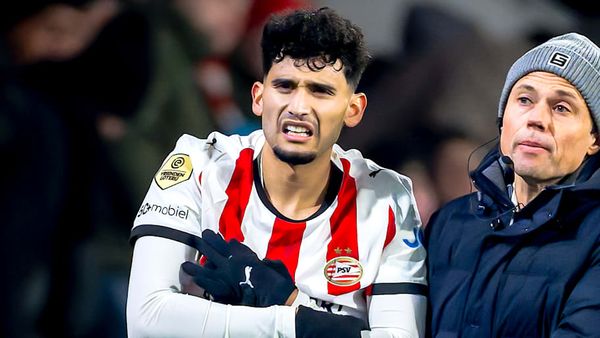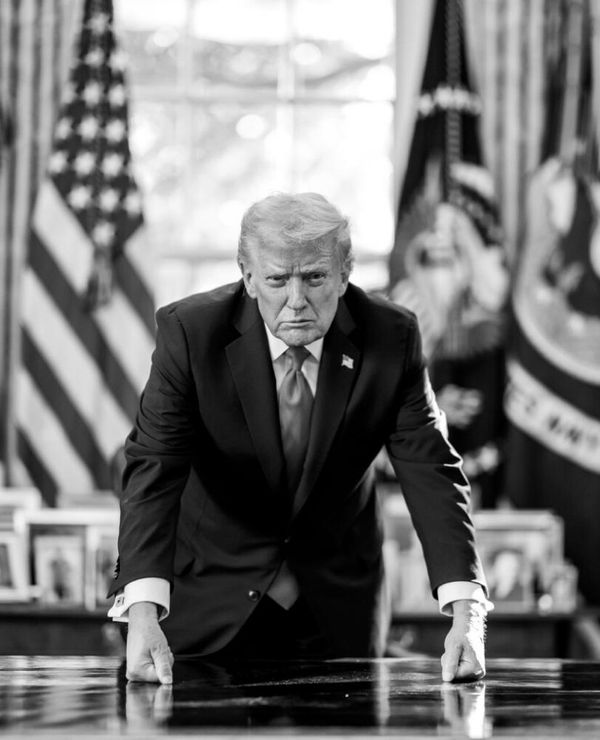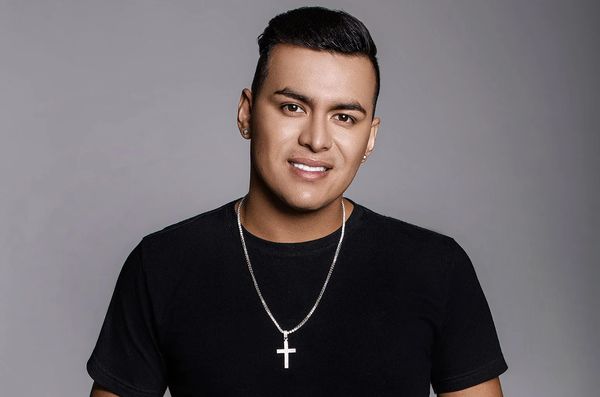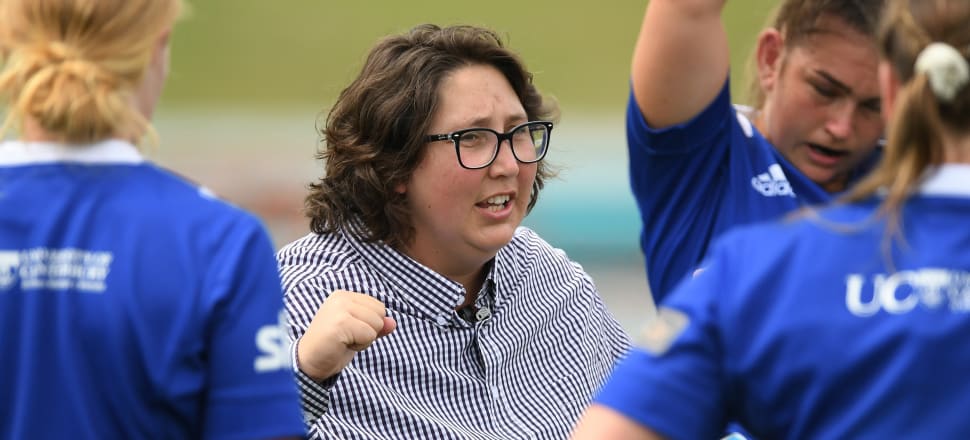
In an exclusive interview, Whitney Hansen tells Suzanne McFadden why she had to seriously contemplate stepping up to the assistant coach role with the Black Ferns
While the Black Ferns are in their Christchurch dojo – a padded room where they practise wrestling and grappling – Whitney Hansen ducks outside to chat.
It’s the day after the announcement revealing Hansen as the new assistant coach of the Black Ferns, and as she talks to LockerRoom, she chews over her words carefully.
In fact, she’s been chewing hard these past few days, thanks to the advice from two highly experienced rugby coaches - Wes Clarke and her father, former All Black coach Sir Steve Hansen.
She approached both men for guidance when she was offered the assistant coach role in the lead-up to the Black Ferns' defence of the Rugby World Cup, now just six months away.
It was a huge decision for Hansen to accept a role that’s emerged much earlier in her career than she’d expected, after head coach Glenn Moore’s sudden resignation a week ago. A role that will no doubt put her under intense spotlight, with the rest of the new coaching ‘structure’, as it’s called.
An intern in the Black Ferns camp for the last two years, as part of their World Cup campaign, Hansen had to seriously consider whether she was ready to make this next leap.
It was Clarke, a long-time Black Ferns assistant coach and husband of former Black Ferns captain Farah Palmer, who initially gave her “some very good advice”.
“Wes said ‘Sometimes when opportunities present themselves earlier than you expect, you bite off more than you can chew. And you just chew really hard',” Hansen says.
“And that’s where I’m at, at the moment.”
Hansen’s dad, now living and working in rugby in Japan, backed that up.
“I talked to Dad before I accepted it. He’s always been the biggest advocate of me and all my siblings, a huge supporter of what we’re doing,” says Hansen, one of his four now-adult children.
“And he’s very much aligned with the mentality of biting off more than you can chew. He'll be there to support me with anything else that I need on the ‘chewing hard’ part.”
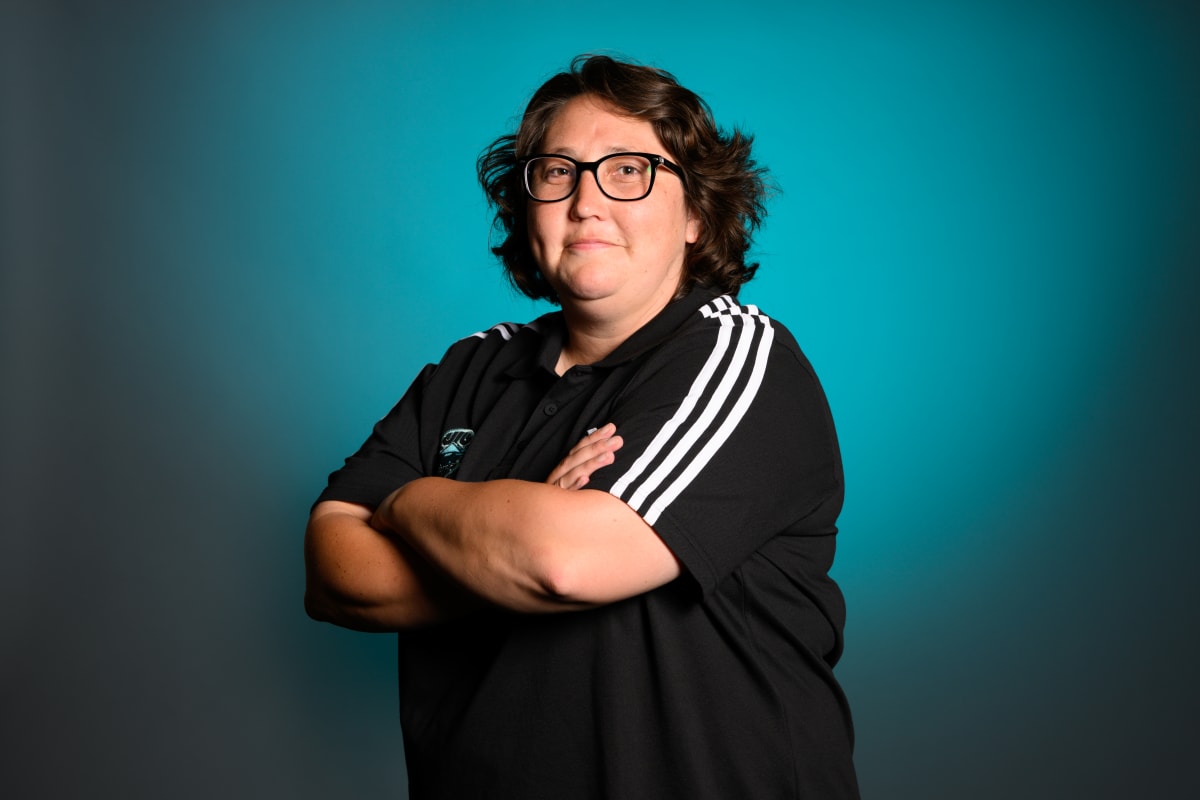
Whitney Hansen, who's 35, was comfortable with her decision knowing she’ll still be learning as she goes - in the overhauled coaching structure with newly-appointed ‘director of rugby’, Wayne Smith, at its apex, through until the end of this World Cup.
“I’ve always been very much about being at my best for the people I’m in front of. Every coach has spaces where they can be better,” she says.
“And I’ll be working really hard, and with great resources around me and people like [setpiece coaching expert] Mike Cron, Wes and Smithy, to grow into those spaces where I need to quickly.
“I’ll work hard to share the things I have, and work hard to learn the things I don’t.”
That’s where Hansen’s other career, as a primary school teacher, is helpful. Had she not taken up this coaching role, she’d be heading back to St Francis Assisi School in Christchurch after the school holidays, where she’s been deputy principal.
“There are lots of similarities between teaching and coaching. They’re both about relationships and growing people, and you can’t do that without engaging them,” she says.
___
“She’s highly thought of in the group by both players and coaches. This is a step up for her. It’s a great opportunity; she’s a smart woman who comes across well and has very good influences on this team of girls.” – Wayne Smith
___
Hansen readily admits she’s still a student of the game.
Since she began coaching her Canterbury University club side (the front rower and No.8 stepping up, with no-one else to coach the forwards), it’s been a steep learning curve.
After she was invited to become the setpiece coach for the Farah Palmer Cup champion Canterbury side, a pathway opened up: assistant coach of the Black Ferns Development XV, New Zealand’s first women’s Barbarians side, and this season Matatū in the first Super Rugby Aupiki.
But perhaps the assignment that placed her in the optimal position to step into the Black Ferns chain of command – an internship through a World Rugby programme aimed at increasing the number of female coaches in the game. Their goal, to have at least 40 percent of all coaches at the 2025 World Cup to be women.
Of course, it’s Hansen’s dream to be head coach one day. “There’s a desire to do that for Matatū at some stage, and a desire to do that with the Black Ferns as well,” she says. “I don’t have a timeline on that.”
What’s most important to her is being the right person for the job: “I’ll always be an advocate for whoever those players are, getting the best person in front of them.”
There's been a lot of discussion over the last few months around the lack of female coaches playing leading roles in New Zealand rugby, and whether a woman should coach the next generation of Black Ferns. The four teams in last month’s inaugural Super Rugby Aupiki all had men as their head coaches, with women in the assistant roles.
But that didn’t upset Hansen.
“I think it would be great to see more women in men’s and women’s rugby coaching roles. I can’t speak for everyone else… but I wasn’t ready to be in that space of head coach,” she says.
“I was fully behind Blair Baxter being the Matatū head coach, and I was pretty excited to work with him. I think we’re lucky to have people like Tony Christie [Matatū’s attack coach] working in the women’s game.
“I’m really grateful for both men and women who coach the women’s game."
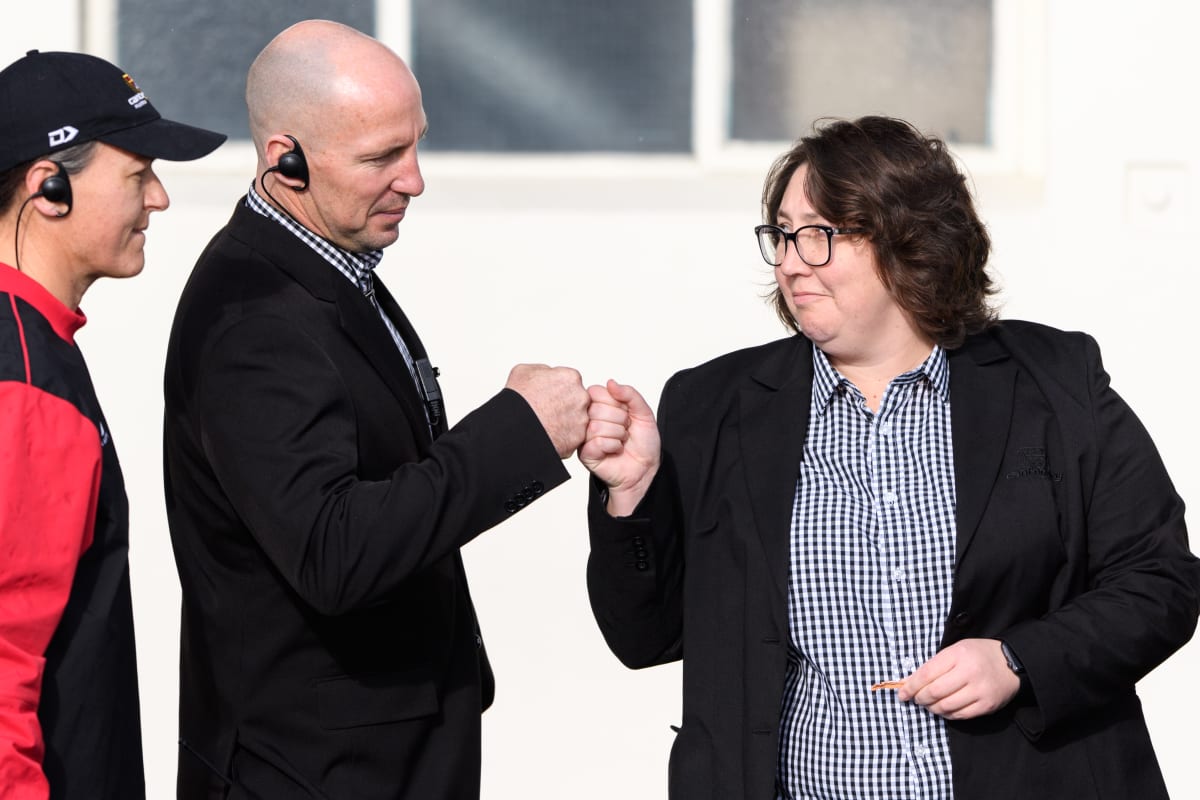
While there’s a feeling that the progress of female coaches to the upper echelons of the sport has been stymied, Hansen believes there is a “genuine pathway”.
“I can only speak to my experience, but I’ve always felt there was a pathway, and I’ve always felt really supported - by Canterbury Rugby, by Matatū and by NZR," she says. "I’ve been given a huge amount of opportunities, and have had numerous coaches and coach educators who’ve gone out of their way to connect with me and help support and grow me in my career.”
___
"I think there's a wake-up call here and things will move pretty quickly. We've got Whitney in the [Black Ferns coaching team], there are other women like Crystal Kaua, who was assistant coach of Chiefs Manawa. Mel Bosman, Anna Richards. There's all sorts around the country, we just need to make sure we put some resource into them and bring them through. Not just as coaches in the women's game, but coaches in the men's game, as well. Why not?"- Wayne Smith on Morning Report.
___
Hansen expected her internship role with the Black Ferns in their 2021 World Cup campaign (stretched out a year by Covid) would be a less hands-on, more fly-on-the-wall experience.
“I thought I’d be turning up with my notebook and pen, and putting the odd cone out,” she says, laughing. “Just learning and observing.
“But I was very much welcomed in by the whole management from the get-go, and 'intern' was really just a title. I’ve loved it.
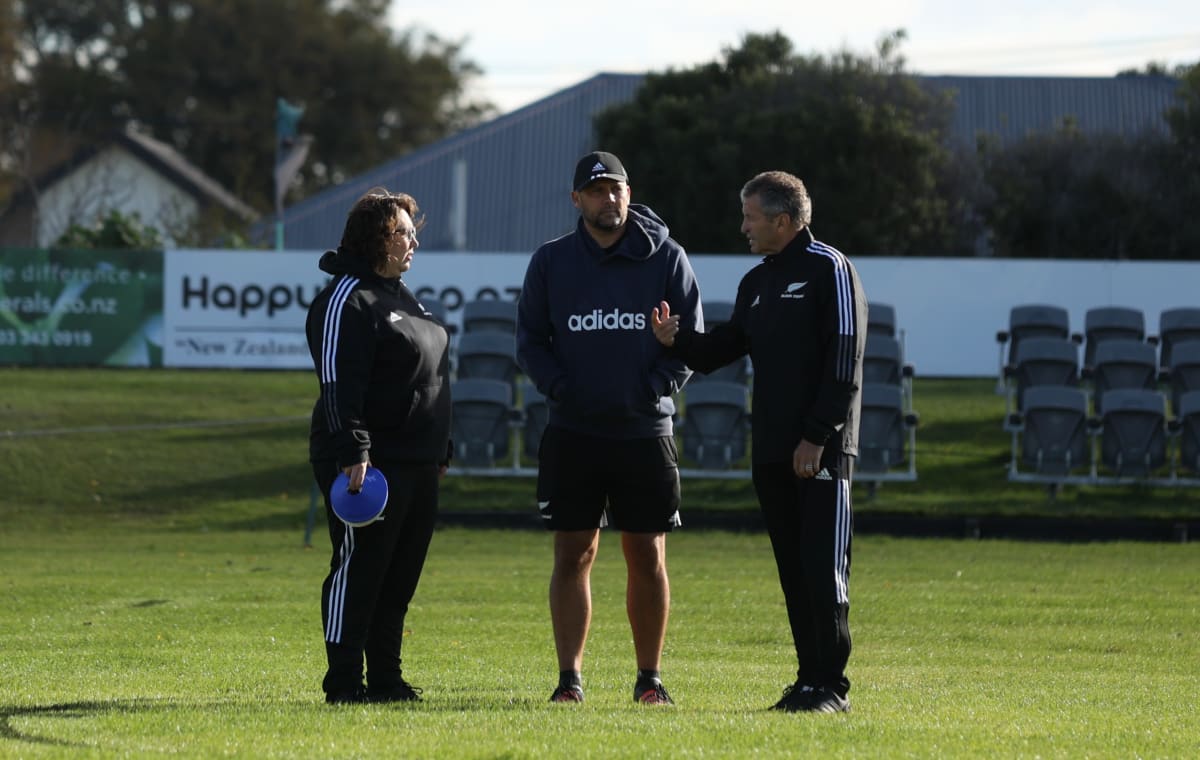
“It’s just such an amazing opportunity to come into a high performance space. To sit in a full stadium in France and soak up that atmosphere, and be in the coaches box. At another game I was down on ground level and got to witness the haka and the national anthem and be a part of all those pieces.
“And then the day-to-day behind the scenes, and what that looks like; this experience for me is second-to-none. I wouldn’t be able to take this position if I hadn’t had that.”
Hansen didn’t wish to comment on the findings of the long-awaited review into the culture of the Black Ferns camp, which revealed “challenges” in its high-performance environment (and soon after saw Moore resign).
“I’ve been really lucky to have worked with the coaches who’ve been in here, and Smithy and Wes who I’ll continue to work with,” Hansen says.
“I’ve always felt that my voice has been valued and I’ve been given real opportunities on and off the field to be in front of the group – whether it’s presenting in the review space or on-grass coaching."
___
"She's done it all by herself and we're very proud of her. I haven't had to advise her too much. She's a smart cookie and a teacher by trade anyway, and understands the importance of getting her message across so people understand why they need to do things," Steve Hansen on One News.
___
With the short timeline till the Rugby World Cup kicks off in October, and the Black Ferns having to play catch-up after their Northern Tour drubbings at the hands of France and England, NZ Rugby have adopted a different approach to the traditional coaching set-up.
“I think there will be a really collaborative approach to a lot of the stuff we do,” Hansen says. “My portfolio will be mainly setpiece, forwards and attack shape, working alongside Smithy on attack.
“I can see why he has the nickname ‘Professor’ - he very much has a different way of looking at the game. There’s a real confidence in his commitment around where we’re heading and what we’re trying to do.
“And it’s different to what everyone else is doing. So that’s really exciting to be part of.”
Under the tutelage of Wayne Smith, the Black Ferns prepare for combat with training in the dojo.
Hansen will also be working closely with Cron. “I’m so lucky to be working with these two – it’s a dream come true for a lot of coaches.”
Her relationship with Cron, in particular, has helped shape the coach she’s become. It reaches back to when she started coaching in the Farah Palmer Cup.
“He’s been open to sharing anything and everything with me. The first time he invited me around to talk for an hour, and we ended up spending three,” she says.
“And that was the start of a journey where he’ll often flick me a text after a game, or we’ll have a phone call to debrief, or I’ll get him to come down and see how I’m going. Now getting him in as a resource coach of the Black Ferns, I’ll be able to continue to grow that connection and learn from him, which is pretty special.”
(Cron, incidentally, learned a lot from coaching club rugby alongside Whitney's grandfather, Des Hansen. Cron later helped Steve Hansen to coach the All Blacks and Wales.)
Hansen also pays homage to former Silver Ferns coach Lyn Gunson for helping her get this far. Hansen was in the first intake of Te Hāpaitanga, a Sport New Zealand initiative to help establish more women in high performance coaching roles through mentorships and connecting a network of women from different sports; Gunson is the programme leader.
“It’s helped me 100 percent,” Hansen says. “I don’t know how to compare that experience; to have had the time to spend with other female coaches across different codes. Having connections and growing relationships, and a mentor in people like Lyn Gunson, is invaluable. She’s just an amazing human.”
Hansen is also grateful to Baxter, a coach educator in Canterbury when she started coaching, and who asked her to be his assistant with the Canterbury women.
___
“I know Whitney is obviously going to get a lot of support from her dad in this space. I’m really excited for Whitney, I used to play rugby alongside her too, and now she’s my coach for Matatū and Canterbury, and now she’s a coach for the Black Ferns. I’m super proud of that and the girls really respect that and are really excited about having her on board.” – Black Ferns halfback Kendra Cocksedge.
___
And then there’s her dad.
“My siblings often joke when Dad and I are on the phone, or in the same space, they need to give us half an hour or an hour to just get lost in rugby chat - which they can’t be bothered listening to,” she says.
“He’s been an amazing mentor to me, and open to sharing everything with me, and that’s been pretty invaluable. He has a pretty different way of looking at the game, too.”
They talk on the phone often; Sir Steve is director of rugby at Toyota Verblitz in the city of Toyota. “He’s on his own a lot so he’s very available,” his daughter says.
One of his coaching strengths is his connections with people, an attribute Hansen believes she can add to the Black Ferns. “I like to think that I bring the ability to connect and grow relationships with people. And also a drive to be what these girls deserve to have in front of them,” she says.
This first Black Ferns camp under new leadership ends on Sunday, before the 42 players return to their provincial hubs; a squad will be chosen to play a series of yet-to-be announced internationals before the World Cup. Most of those players now have fully professional contracts for the first time.
“I still think there’s a way to go in terms of the systems and resources wrapped [around] those players. But it’s pretty exciting to see the growth of the game and what we’ve been able to achieve in the last 12 months,” Hansen says.
So through the defeats, the internal turmoil and coaching upheavals the Black Ferns have endured of late, does Hansen believe they can win the only World Cup that New Zealand will have played on home soil?
“I think we’re absolutely going in with every intention of doing everything we can do to that,” she says. “I’m excited we’re going to bring something different than anyone else will have, and the girls and management group will do everything we can to put us in a position to win that World Cup.”
